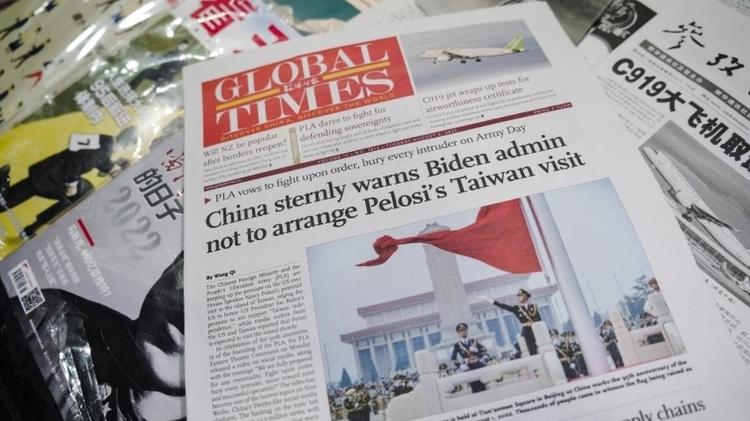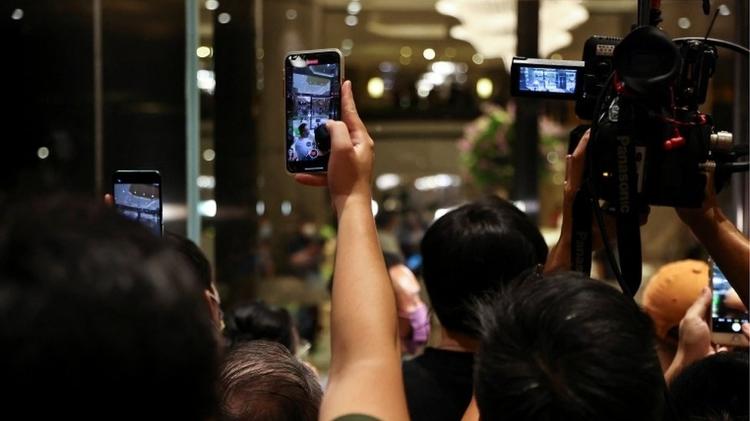The Chinese People’s Liberation Army will hold a three-day military exercise from Wednesday, after US House of Representatives Speaker Nancy Pelosi visited Taiwan on Tuesday, 8/2.
According to the military, Chinese aircraft and ships will conduct maneuvers and test long-range munitions in six large areas off Taiwan’s north, south, east and west coasts.
Taiwan’s defense ministry said the exercises were an attempt to psychologically intimidate the island’s citizens, but urged the public not to worry, saying the armed forces are monitoring the situation and are in a position to protect the island state.
China also suspended imports of 35 Taiwanese cookies and candy exporters on Tuesday. Products are important trade items between Taiwan and China, including Hong Kong.
According to Taiwanese media reports, nearly two-thirds of Taiwan’s exports in 2021 were cookies and confectionery with a total value of US$646 million. In 2020, the value reached US$660 million, representing 37% of total exports.
It is estimated that more than 100 companies in Taiwan will have to give up doing business with China after the sanction takes effect.
But experts warn that this may not be the only Chinese response to the visit.
China condemned the visit
China’s Foreign Ministry strongly condemned Pelosi’s visit to Taiwan, calling it a “serious violation of the One China principle” that would have a “serious impact” on the political basis of Sino-US relations.
The ministry said in a statement that the visit “serious violations of China’s sovereignty and territorial integrity”.
“This seriously undermines peace and stability in the Taiwan Strait and sends a seriously false signal to the separatist forces for ‘Taiwan independence,'” the ministry said.
Since 1979, the US has agreed to recognize the “One China” policy. This means that the US recognizes China’s position that there is only one Chinese government.
Under this policy, the United States has official ties with China, not Taiwan. But the United States still supports the island and has pledged to assist in self-defense, including by providing weapons.
The Chinese Communist Party threatened to use force if Taiwan officially declared its independence.
Pentagon spokesman John Kirby told reporters that Nancy Pelosi’s visit was consistent with the “One China” policy. He stated that there is no need to turn this into a crisis and that the US still does not support Taiwan’s independence.
Kirby added that the United States is against any change. status quo and that all differences should be resolved peacefully.
When asked if China’s reaction was expected, the spokesperson said yes. “We will continue to monitor (…) their work consistent with the playbook we expect.”
Possible support to Russia
Margaret MacMillan, an honorary professor of international history at Oxford University, raises the possibility of China retaliating by supporting Russia in its offensive against Ukraine.
“I hope it won’t be one of those historic moments when we all look back and say ‘this was really the beginning of something,'” MacMillan told the BBC.
“The Chinese did not condemn the Russian invasion of Ukraine, but they did not sell weapons to them. They did not really encourage them in Ukraine, did not give them sincere support. I wonder if this will change?” Adds Oxford professor.
Russia has warned that Pelosi’s trip to Taiwan is “a clear provocation” and risks accelerating the conflict.
Kremlin spokesman Dmitry Peskov previously said that “everything about this tour and the possible visit to Taiwan is completely provocative.”
The Moscow Foreign Ministry later said that China has the right to “take measures to preserve its sovereignty”.
Beijing cyber attacks and criticism
Taiwanese government and presidential websites were shut down on Tuesday ahead of Pelosi’s arrival.
Such outages can result from a spike in visitor numbers, or from a deliberate cyberattack aimed at shutting down websites.
Taiwanese officials told Reuters that a cyberattack, at least on the presidential website, should be blamed, without saying who was behind it.
Also, prior to Pelosi’s arrival, the Chinese government has repeatedly voiced its opposition to the US congressman’s visit.
Last week, Chinese President Xi Jinping told US President Joe Biden that “whoever plays with fire will burn.”
On Monday, State Department spokesman Zhao Lijian warned of the “serious consequences” of the US Democratic leader’s visit and said the People’s Liberation Army (PLA) would not stand by.
Meanwhile, the Army’s eastern command, which covers the part of the mainland closest to Taiwan, posted a video on social media saying it is “fully prepared for any eventuality”.
The Chinese Army celebrated its 95th anniversary on Monday (1/8). On Tuesday, an editorial in the state-run Global Times newspaper said the PLA had not fought a war in nearly 40 years, but had improved its combat capability over the past decade.
Social media reaction and protest
On China’s heavily watched social media, comments were made that strongly opposed Pelosi’s visit and encouraged military action.
Many users have called for China to “take back” Taiwan, and only a few messages call for calm.
“We don’t want war… all soldiers have families,” said one. However, these posts were heavily criticized by other commenters.
During Pelosi’s visit, a small protest was held in front of the hotel where the MP was staying by a pro-Chinese group opposing the visit. Some of the protesters unfurled banners that read “go home warmonger”.
– This text was originally published at https://www.bbc.com/portuguese/internacional-62402544.
source: Noticias
[author_name]

